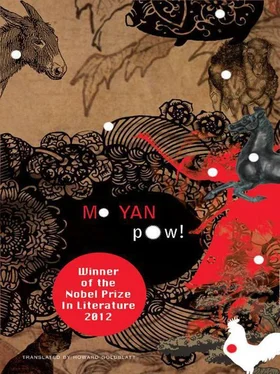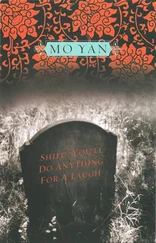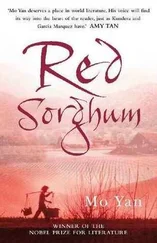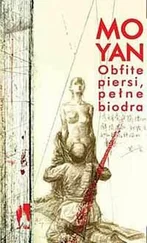When I reach this point in my tale, an unusual warm current floods my heart. The woman who has just hidden behind the statue of the Horse Spirit looks a lot like Aunty Wild Mule. Though she seems familiar I won't let my thoughts turn in that direction, because Aunty Wild Mule died ten years ago. Or perhaps she didn't. Or perhaps she did and has been reborn. Or perhaps someone else's soul came back to use her body. Waves of confusion ripple through my mind as the scene before me seems to float in the air.
My father was much smarter than Lao Lan. He'd never studied physics but he knew all about positive and negative electricity; he'd never studied biology but he was an expert in sperm and eggs; and he'd never studied chemistry but he was well aware that formaldehyde can kill bacteria, keep meat from spoiling and stabilize proteins, which is how he guessed that Lao Lan had injected formaldehyde into his meat. If getting rich had been on his agenda he'd have had no trouble becoming the wealthiest man in the village, of that I'm sure. He was a dragon among men, but dragons have no interest in accumulating property. People have seen critters like squirrels and rats dig holes to store up food, but who's seen a tiger, the king of the animals, do something like that? They spend most of their time sleeping in their lairs, coming out only when hunger sends them hunting for prey. Most of the time my father cared only about eating, drinking and having a good time, coming out only when hunger pangs sent him looking for money. Never for a moment was he like Lao Lan and people of that ilk, who accumulated blood money, putting a knife in white and taking it out red. Nor was he interested in going down to the train station to earn porter's wages by the sweat of his brow, like some of the coarser village men. Father made his living by his wits. In ancient times, there was a famous chef named Pao Ding who was an expert at carving up cows. In modern times, there was a man who was an expert at sizing them up—my father. In Pao Ding's eyes, cows were nothing but bones and edible flesh. That's what they were in my father's eyes too. Pao Ding's vision was as sharp as a knife, my father's was as sharp as a knife and as accurate as a scale. What I mean to say is: if you were to lead a live cow to my father, he'd take two turns round it, three at the most, occasionally sticking his hand under the animal's foreleg—just for show—and confidently report its gross weight and the quantity of meat on its bones, always within a kilo of the digital scale used in England's largest slaughterhouse. At first, people thought he was a windbag but after testing him several times they turned into believers. In dealings between cattlemen and slaughterhouses, his presence took blind luck out of the equation and established a basis of fairness. Once his authority and status were in place, both the cattlemen and the butchers courted his favour, hoping to gain an edge. But as a man of vision, he'd never jeopardize his reputation for petty profits, since by doing so he'd smash his rice bowl. If a cattleman came to our house with wine and cigarettes, my father tossed them into the street, then climbed onto our garden wall and cursed loudly. If a butcher came with the gift of a pig's head, my father flung it into the street, then climbed onto our garden wall and cursed loudly. Both the cattlemen and the butchers said that Luo Tong was an idiot but also the fairest man they knew. Once his reputation for being upright and incorruptible was established, people trusted him implicitly. If a transaction reached a stalemate, the parties would look at him to acknowledge that they wanted things settled. ‘Let's quit arguing and hear what Luo Tong has to say!’ ‘All right. Luo Tong, you be the judge!’ With a cocky air, my father would walk round the animal twice, looking neither at the buyer nor at the seller, then glance up at the sky and announce the gross weight and amount of meat on the bone, followed by a price. He'd then walk off to smoke a cigarette. Buyer and seller would reach out and smack hands. ‘It's a deal!’ Once the transaction was completed, buyer and seller would come up to my father, each hand him a ten-yuan note and thank him for his labours. The old-style brokers were dark, gaunt, wretched old men, some with queues hanging down their backs. They were proficient in the art of haggling via finger-signs made from deep within their wide overlapping sleeves, thus lending the profession an air of mystery. My father's appearance took the confusion out of buying and selling cattle and brought an end to the darker aspects of the process. He effectively drove the shifty-eyed brokers off the stage of history. This remarkable advance in the buying and selling of cattle on the hoof could, with only a bit of exaggeration, be called revolutionary. Displays of my father's keen eye were not limited to cattle but worked with pigs and sheep as well. Like a master carpenter who can build a table but can also build a chair, and, if he's especially talented, a coffin, my father had no trouble sizing up even camels.
When I reach this point, I seem to hear the barely audible sound of sobbing from behind the Wutong Spirit. Can it really be Aunty Wild Mule? If it is, why hasn't her face changed in more than a decade? No, that's impossible, it can't be. But if she isn't, why can't I tear myself away from her? Perhaps she's Aunty Wild Mule's ghost. Legend has it that ghosts don't cast a shadow. Too bad I didn't think to see if she cast a shadow when she came in. But it's a rainy day, dark and gloomy, and no one casts a shadow when there's no sun. So it wouldn't have done me any good if I'd thought to look. What's she doing there behind the idol? Rubbing the rump of the human-headed Horse Spirit? A decade ago I heard someone say that there are women who will kneel before this idol and burn incense to plead for the restoration of their impotent husbands’ manhood, then go round to the rear and pat the rump of the handsome, powerful, magnificent young stallion. I know there's a wall behind the statue, and a little door that opens onto a tiny windowless room that's so dark you have to light a lantern to see, even in the middle of the day. The room is furnished with a wobbly bed covered by a blue quilt made of coarse cotton. The bundle of rolled wheat straw that serves as a pillow and the quilt are greasy. Hordes of fleas lie in wait, ready to jump excitedly and noisily onto anyone who enters with exposed skin, as do the bedbugs resting on the walls: ‘Meat, here comes meat!’ they seem to squeak in excitement. People eat the flesh of pigs, dogs, cows and sheep; fleas and bedbugs eat the flesh of humans. This is known as the subjugation of one species by another or, simply, tit for tat. The woman, whether or not she's Aunty Wild Mule, I want to tell her: ‘Come out here! Don't let those evil creatures spoil your sumptuous skin and flesh. And you surely don't want to pat the horse's rump. My heart aches for you and I wish you'd come out and pat me on the rump.’ I say that, even though I'm aware that, if she is my Aunty Wild Mule, then my thoughts are sinful. But I can't control my desires. If this woman will take me away with her, I'll give up my plan to join your order, Wise Monk. I can't tell any more of my story right now. I'm confused. The Wise Monk seems to be able to read my mind, since I didn't say any of this but merely thought it. But he knows. His sardonic laugh brings an end to my lustful thoughts. All right, I'll go on—
Father carried me on his shoulder over to the threshing ground early one summer day. After our village was turned into a huge slaughterhouse, the fields, for all intents and purposes, were left fallow, since only a fool would till a field and not take up butchering, thanks to the advent of injecting water into the meat. Then, once the fields lay fallow, the threshing ground was converted into the place where cattle were bought and sold. The township officials had wanted to use the government square, so they could collect a management fee, but the people would have none of it. When they came to the cattle exchange with soldiers, to force the people to stop doing business there, they ran up against men armed with butcher knives. Fights broke out and people nearly died. Four butchers were arrested. Their wives organized a protest and went to the county seat to stage a sit-in demonstration, some with cowhides over their shoulders, some with pigskins, some with sheepskins. They raved and ranted, vowing that if their demands were not met then they'd take them to the provincial capital, and if that didn't work then they'd board a train to Beijing. The very prospect—women draped in the hides of slaughtered animals showing up on Changan Avenue in the capital—was too frightening to contemplate. No one knew what to do with them, but the county chief was sure to lose his job if the protest continued. So in the end the women won. Their husbands were freed, the township officials’ dream of great wealth was shattered and the village threshing ground once again teemed with animals, everything from cattle to dogs. There was even talk that the township chief received an earful from the county chief.
Читать дальше












